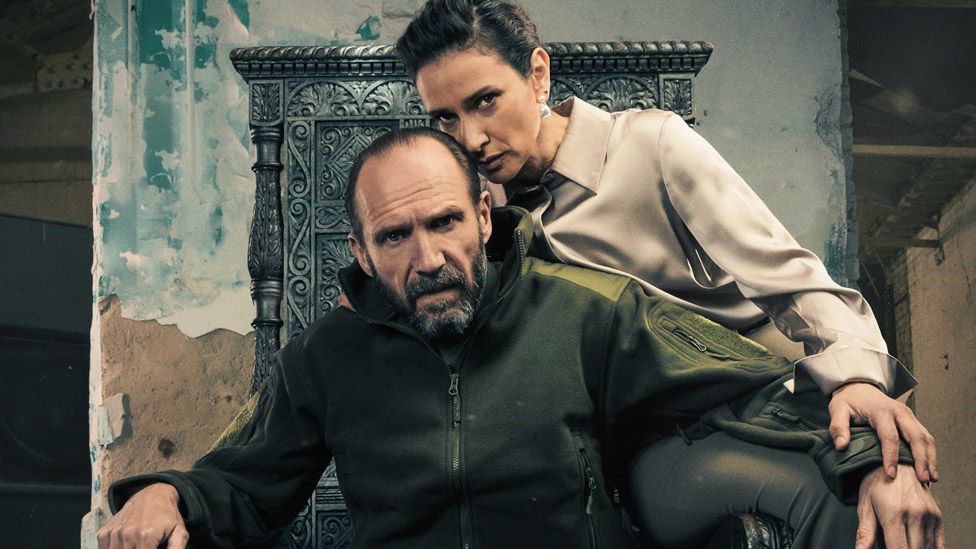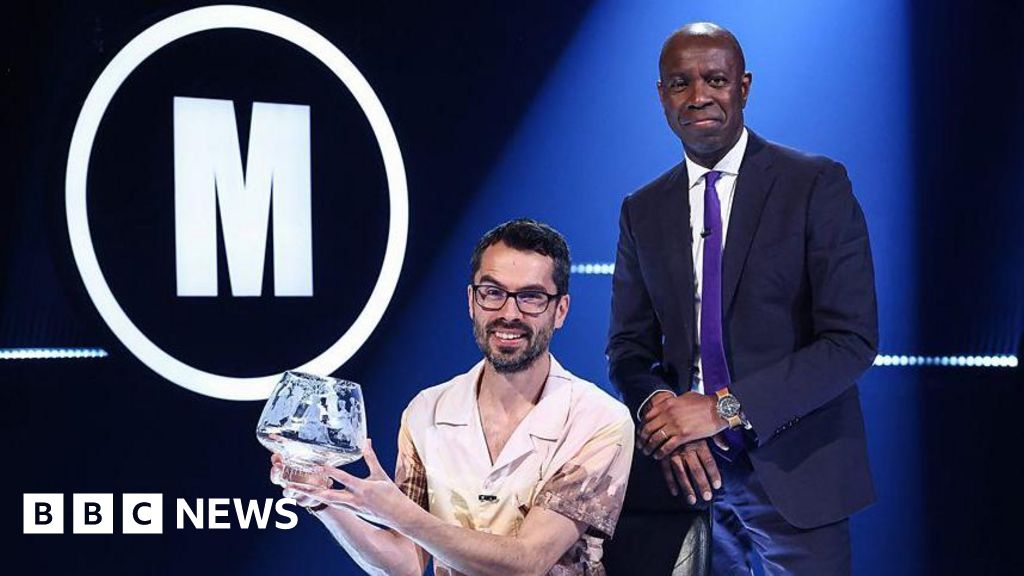ARTICLE AD BOX
 Image source, Oliver Rosser
Image source, Oliver Rosser
Ralph Fiennes plays Macbeth, with Indira Varma as Lady Macbeth
By Ian Youngs
Entertainment & arts reporter
Ralph Fiennes and Indira Varma, two of Britain's most acclaimed actors, are in a warehouse in Liverpool, sitting in the middle of a wasteland of charred trees, giant lumps of blackened rubble and a burned-out car.
This immersive set has been built for the pair's new version of Shakespeare's Macbeth, which is avoiding traditional theatres in favour of different kinds of venues.
In their mock war zone, it feels a far cry from the West End.
Audience members must walk through this modern reimagining of Macbeth's battlefield, which sets the scene before they take their seats in the makeshift auditorium.
"Hopefully [it] gives them a sense of the destruction of war - the devastation and the chaos and the mess and the horror," explains Fiennes, who is in the title role.
Audience members must walk through a mock war zone, complete with burning car
As the simulated scene of urban destruction suggests, this is a contemporary staging of the play. Combat fatigues for the cast are packed on racks outside the dressing rooms at the Liverpool venue.
The Depot was built in 2021 by the city council as a film and TV studio, but between now and Christmas an audience of 900 people a night will watch Macbeth here live.
The production - burning car and all - will then move on to similar spaces in Edinburgh, London and Washington DC.
Image source, Liverpool Film Office
Image caption,The Depot is run by Liverpool Film Office and its warehouses are normally studios for films, TV shows and adverts
Why do it in these warehouse venues?
"As a punter myself going to see plays, I love being taken out of my comfort zone," Fiennes replies. "It's exciting to me.
"I think that is a shared feeling when audiences are provoked [and] encouraged to go outside the normal theatres they know, or theatre occasions they're familiar with."
Image source, Getty Images
Image caption,Fiennes won a Tony Award for playing Hamlet in 1995
Fiennes is one of the UK's most celebrated Shakespearean actors, having played parts from Romeo to Richard III. He's also known for appearing as Voldemort in Harry Potter and M in the last three James Bond films.
Now he is tackling the Bard's power-hungry Scottish warrior.
Varma, playing Lady Macbeth, is no stranger to violent and scheming rivalry after starring as Ellaria Sand in Game of Thrones.
The actress is also in the new series of Doctor Who, the recent Obi-Wan Kenobi on Disney+, the latest Mission: Impossible film, and has won an Olivier Award for her stage work.
Image source, Getty Images
Image caption,Varma with Game of Thrones co-star Pedro Pascal at a premiere in 2019
"Creating an event, I think, is really exciting," she says. "Often, as a punter, you go to the theatre and you know what you're expecting to see.
"There's a sense of comfort and sitting back, being a little bit passive, maybe. But this is altogether different."
The show's director Simon Godwin says they wanted to "rethink everything about the whole experience" of staging a play.
Macbeth's message "can resonate much more acutely and powerfully in an environment where the audience is not able to quite sit in their comfortable, plush red seats with their gin and tonic and their ice cream", he continues.
Image source, Matt Humphrey
Some might also feel a sense of discomfort walking through the recreated war zone, especially as we're seeing images of the horrors in real war zones.
Godwin says: "Making a play a set in a contemporary war zone, as the wars around us have increased, becomes very poignant, and also complex, because one asks, are we doing it set in Ukraine? Are we setting our play in the Middle East?
"And the answer to those questions is, we're not. We're setting it in a kind of archetypal modern landscape that has inevitable references to the conflicts that we're all living through."
That doesn't mean the cast haven't taken inspiration from current events and leaders.
Image source, Matt Humphrey
Image caption,Fiennes rehearsing a fight scene with Ben Turner playing Macduff
When asked who she was thinking about when working out how to play the calculating and cut-throat Lady Macbeth, Varma replies: "It's hard not to think about certain people, isn't it? Political figures out there."
Such as? She would rather not say. Fiennes, however, is less cagey about who helped shape his Macbeth.
"The first thing I think we discussed as a group, and certainly privately, I'd go, who are the autocrats today?
"Clearly there's one in Russia, there's an emergent one in Turkey, there's an emergent one in Hungary, we've had the guy Bolsonaro in Brazil. So there are people out there.
"Donald Trump, I think, would love to be an autocrat if he could.
Power 'at whatever cost'
"So these people reaching for extreme total power, and in order to maintain that power they have to eviscerate and take down the opposition, and we see it happening. The dark need to have power and take down your opponents is still very present."
The UK has "a pretty decent democracy", Fiennes continues.
"But nonetheless, I think the pulse towards grabbing the top job at whatever cost exists in a lot of politicians, and it's very active and dangerous and it's having an effect on the world we're living in."
Image source, Matt Humphrey
Image caption,Lola Shalam, Danielle Fiamanya and Lucy Mangan play the three witches
The play's themes of ruthless and destructive ambition never go out of fashion.
There have been recent versions by the Royal Shakespeare Company and English Touring Theatre, while there are bound to be comparisons with David Tennant, who is about to do Macbeth at the Donmar Warehouse in London.
"I'd love to see it," Varma says. "I think it's really exciting that we can tell this same story at the same time in many different ways.
"And it's always going to be different. I don't think we should be pitted against each other. I think we should be supporting one another. It would be actually brilliant to all sit in a room and chat about our interpretations of it."
"I agree," Fiennes adds, clearly not wishing to be drawn into discussion about his fellow Macbeths.
'Silly' superstition
At 60, Fiennes is approaching the upper end of the age scale to convincingly portray Shakespeare's fearsome warrior.
But he dismisses the suggestion that he's too old to play the role by quoting a line from the end of the script when Macbeth reflects on his life.
"I have lived long enough. My way of life is fall'n into the sere, the yellow leaf.
"So you say those lines, and if you're 60, it works."
The actor also has little time for the "silly idea" that it's notoriously bad luck for actors to speak the name of the play in a theatre - and not just because this isn't a proper theatre.
"Macbeth! Macbeth! Macbeth!" Fiennes calls merrily.
"I mean, the play is dark. It's dark, dark, dark. I think that superstition is because it's terrible horror story, which ends with the implication that it will go on."
Macbeth is at The Depot on Liverpool until 20 December before going to the Royal Highland Centre in Edinburgh, Dock X in London and Washington DC in 2024.

 1 year ago
33
1 year ago
33








 English (US) ·
English (US) ·